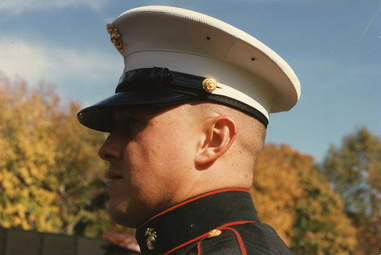 So there, I was . . . sitting across the table from the dinner guest who stared at me with hard, challenging eyes. The others at the table had turned toward me and the conversation had fallen silent. I slowly flipped my knife back and forth, feeling pressured to come up with an answer to “why do people sign up for the military?” I looked at the flickering candles and tried to slow my heartbeat before I said, “It’s a good question. I’m just wondering. Have you ever asked a soldier why they do what they do?” “Ask a soldier?!?! Where the hell am I going to find a soldier?” he said, sitting back in his chair and folding his arms across his chest. “Oh,I don’t know – maybe at the V.A. or a Memorial Day event or at the airport or whatever. I just thought they might be the right person to ask. Their answers might surprise you.” He waved his hand at me as if to brush off my ridiculous suggestion, and I saw the understanding-gap that exists between the military and civilian worlds. I watched him push back from the table to walk away, and I had great compassion for what it might be like to be in the military and have so many people judging you, without ever talking to you or trying to understand. I really meant it: why not ask a service member or a combat veteran? Why not sit down and say, “So tell me, why did you sign up? What do you like about being in the military? What does it mean to you?” I just thought if my dinner friend could ask – and truly hear the soldier’s response – there might be some lessening of the great divide between military and civilians. The evening of my reading, when the peace activist stood in front of me demanding to know how I could possibly work for the military, I motioned to the couches right next to us, and said, “Let’s talk about it.” “How could you work for an entity that creates war?” she said with the familiar accusatory emphasis. “Well, look at it this way,” I said. “That same military put me – a civilian counselor – on bases to support their troops. That’s astounding, don’t you think? For the first time in the history of the military, folks could get free, confidential help with the burdens they carry.” She sat back in the couch’s pillows, shaking her head to indicate my comment didn’t really satisfy her challenge. “Well, it doesn’t mean the military doesn’t fight wars, but something must be changing if they are dialed into the fact that service members need more help, right? A couple of wars ago, soldiers couldn’t even admit they suffered from combat.” In both of these instances, I didn’t expect to change anyone’s mind – but I guess I wanted to interrupt the assumptions and judgments. In the years I worked on bases, I talked with thousands of soldiers and spouses; I spoke with privates and commanders, infantrymen and engineers, Marines, sailors and airmen. I learned a lot about why soldiers (and marines, sailors and airmen) did what they did. In my next post, I’ll tell you about some of their answers – surprising, varied, sometimes touching answers. Stay tuned. Previous Comments:sara pearson says: danny johnson says: dagmar says: Linda says:
|
Elizabeth Heaney - AuthorClinical Psychologist, teacher, private counselor. She speaks and writes about her work with service members. Archives
November 2020
Categories
All
|
|
All content (C) Elizabeth Heaney except where noted. All rights reserved, 2016.
Web design by GraphicMedia Design
|
 RSS Feed
RSS Feed